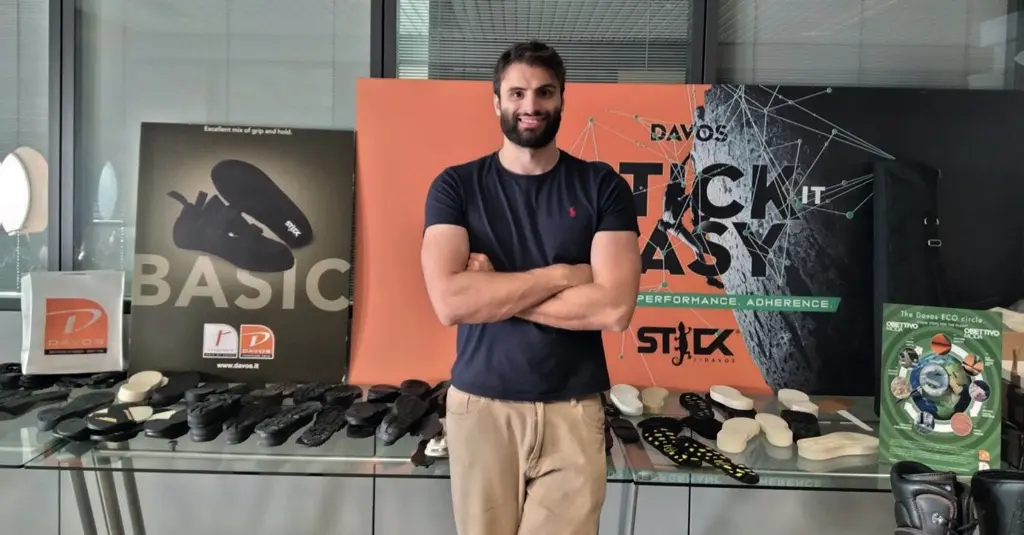Davos Industria Gomma, a long-standing rubber sole manufacturer, was founded in 1955 in Montebelluna, Italy, during a period of significant growth in the footwear industry. Originally specializing in technical footwear under the leadership of Lino Piccolo (still president and a key figure in the company), Davos gradually shifted its focus to the production of Thunit rubber sheets. Thunit, an innovative and patented leather-like material, is used to create soles for a variety of footwear. We spoke with Mirko Vialetto, Sales & Marketing Manager, to learn more about it.
Can you tell us a bit about yourself?
“I have a background in commerce and a deep passion for the world of athletic footwear. After university and some time abroad, I worked for five years at a German company in the luxury sector. Then I joined Davos as Sales and Marketing Manager for Italy. It was the perfect fit because I get to work with products I love, across a wide range: from sneakers and dress shoes to technical footwear and football boots. It’s a company that offers a broad perspective on the footwear world.”
Let’s talk about Davos. The company is well-known for patenting and marketing Thunit. What are its key characteristics?
“Thunit is a leather substitute that offers flexibility, abrasion resistance and waterproofing. In fact, its performance sometimes surpasses that of natural leather. It’s also an environmentally friendly material, completely synthetic and recyclable. We achieve this by reusing production waste, including things like burrs, dust and residues from the rubber sheet manufacturing process, as well as offcuts and trimmings. With a range of over 800 finishes, Thunit rubber sheets are primarily used in the production of soles for dress shoes, casual footwear and walking shoes. This was our core business for many years. However, a downturn in the dress shoe sector pushed us to expand our horizons. We shifted our focus from coated sheets to technical footwear and sneakers, which have now become our primary business.”
So, there’s a strong emphasis on environmental responsibility?
“Absolutely. Davos has long been committed to sustainability. We prioritize the recovery and reuse of waste materials, transforming them into raw materials that can be reintegrated into the creation of new sheets, all without compromising the technical properties of the product. Thunit itself is a vegan material, as it contains no animal products.”
Do you produce the rubber for your sheets in-house?
“Unlike many companies in the rubber and plastics industry that rely on external suppliers for their compounds, we have our own internal R&D lab where our technologists are constantly developing innovative solutions and optimizing formulas to achieve the best results. Rubber production is a highly complex process that’s very sensitive to environmental factors. Humidity and temperature, in particular, significantly influence the final properties of the product. This makes every batch unique. The characteristics we discuss most with our clients are hardness, feel and abrasion resistance. When we provide them with our technical data sheets, we always give a range or a margin of tolerance. Even though we aim for a precise target, there’s always a degree of variability that’s beyond our control. Abrasion resistance is crucial for ensuring the durability of footwear, especially for sneakers from various fashion brands. While sole wear is inevitable, it’s our job to ensure that our clients’ products have a long lifespan. Sometimes, we see variations of 10, 20, or even 30 points in abrasion resistance between batches. This might seem small, but for high-end sneakers, guaranteeing top quality is essential. That’s why we rigorously test every single batch for durability and any batch that doesn’t meet our standards is rejected.”
What have been the major strategic shifts in your business?
“Until recently, Thunit rubber was our flagship product. However, a number of Spanish and Italian competitors have entered the market and the market share has become increasingly divided. In the past year, we’ve actually gained significant market share because one of our competitors experienced production problems. Also, footwear manufacturers have started diversifying their supply chains, opting to work with multiple trusted suppliers. This is crucial for maintaining service continuity and the ability to respond quickly to market demands. Currently, in addition to Thunit, we produce microporous rubber, sneaker soles and welt sheets. We’re also a leading producer of rubber for climbing shoes. Specialists in the field consider our materials to be the highest-performing and safest available. This is a constantly evolving industry and we’re optimistic about the future. We’re focused on quality, creativity, diversification, and innovation.”

Mirko Vialetto, Marketing & Sales
